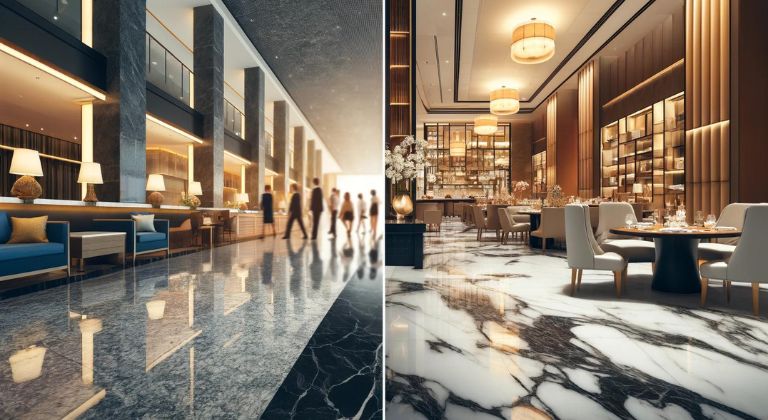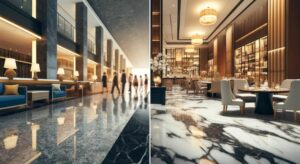Choosing the right materials for commercial properties involves more than just aesthetic appeal. Especially in high-traffic areas, the materials need to withstand heavy use while maintaining their beauty. This is why the choice often comes down to two popular stones: granite and marble. Both stones are favored for their durability and visual appeal, but they serve different needs and come with distinct advantages and challenges.
In this comprehensive guide, we’ll dive into the nuances of granite and marble, helping property managers, architects, and designers make an informed decision for their commercial spaces.
Understanding the Basics
What is Granite?
Granite is an igneous rock, which means it was formed from cooled lava or magma. This process involves the crystallization of materials such as quartz, feldspar, and mica under extreme pressure and heat beneath the Earth’s surface. The result is a very hard and dense material. Granite’s composition and natural formation process make it incredibly durable and resistant to scratches.
Appearance: It has a grainy appearance because it is composed of tightly interlocked mineral grains. This speckled blend of natural colors can effectively hide crumbs, streaks, or fingerprints, which is particularly advantageous for high-traffic areas.
What is Marble?
Marble is a metamorphic rock formed from the recrystallization of limestone. This transformation under heat and pressure in the Earth’s crust creates a denser rock composed mainly of calcite or dolomite. Known for its beautiful veins, marble has a more homogeneous appearance and feels than granite.
Appearance: Marble is prized for its deep, glossy surface and elegant veins of varying colors that run through it, which are formed from mineral impurities such as clay, silt, sand, iron oxides, or chert.
Granite vs. Marble: Comparing Features
Scratch and Chip Resistance
- Granite: Its hardness is one of its most significant benefits, making it highly resistant to scratches. This durability ensures that granite maintains its pristine appearance even under rough use, perfect for high traffic commercial properties.
- Marble: Softer and less dense than granite, marble is more susceptible to scratching. Frequent foot traffic and activity can lead to visible wear and tear over time.
Stain Resistance
- Granite: Being less porous than marble, granite offers better resistance against stains. It can repel most substances when properly sealed.
- Marble: Its porosity makes it prone to staining, particularly from the spillage of acidic substances which can mar its surface.
Maintenance Needs
- Granite: Requires a sealant upon installation and might need re-sealing every two years, but daily maintenance is relatively straightforward, typically needing only a wipe down with warm, soapy water.
- Marble: Needs more frequent sealing to maintain its surface quality and resist stains. Acidic substances need to be cleaned immediately to prevent etching.
Aesthetic Considerations
- Granite: Offers a natural, more casual look with greater color variation. Its robustness and pattern variations are better for hiding everyday wear and tear, making it suitable for busy environments.
- Marble: Adds a touch of luxury and elegance with its classic look. However, its softer, more porous nature means it might show signs of aging more quickly in a commercial setting.
Cost Implications
- Granite: Generally less expensive than marble, it offers better durability and longevity for the price, making it a cost-effective option for many properties.
- Marble: While offering a high-end look, marble comes at a higher cost both in terms of initial installation and maintenance over time.
Longevity and Durability
- Granite: Extremely durable, granite can last indefinitely if properly maintained, making it an excellent investment for commercial spaces.
- Marble: Although beautiful, marble is high-maintenance and may require refurbishing over time due to its softer nature, which can affect its longevity.
Making the Right Choice for Your Property
When selecting between granite and marble, consider the specific needs of your property:
- Traffic Levels: For very high traffic areas, granite is typically the best choice due to its durability and ease of maintenance.
- Aesthetic Goals: If the aesthetic is a priority and traffic is moderate, marble can provide the elegance and style desired.
- Budget Constraints: Granite generally offers a more cost-effective solution considering both installation and long-term maintenance costs.
- Area of Use: In spaces where staining risks are lower and traffic is not as heavy, such as executive areas or seldom-used conference rooms, marble could be a suitable option.
Examples in Commercial Settings
Granite: Ideal for busy hotel lobbies, hospitals, or commercial kitchens where there is significant everyday use and a high potential for spills and stains.
Marble: Perfect for boardrooms, corporate lobbies, or suites where its luxurious finish enhances the decor and less frequent traffic preserves its beauty.
Conclusion
Choosing the
right material for high-traffic commercial properties doesn’t have to be a compromise between aesthetics and functionality. Both granite and marble offer benefits that can meet the needs of almost any property, depending on the specific conditions and requirements of the space.
In-Depth Look at Applications
Granite in Action
- Hotel Lobbies and Entrances: Granite flooring can withstand the constant foot traffic of guests and staff, while its resistance to scratching keeps it looking impeccable over time.
- Restaurants and Bars: Countertops and bar tops benefit from granite’s resistance to stains and minimal maintenance needs, making it ideal for spaces that are prone to spills.
- Commercial Bathrooms: Granite’s durability and ease of cleaning make it suitable for high-use areas like bathrooms, where hygiene and upkeep are paramount.
Marble in Action
- Corporate Lobbies: The luxurious appearance of marble can create a striking first impression in a corporate lobby, projecting elegance and value.
- Hotel Suites: Marble bathrooms in a hotel suite are a mark of luxury and comfort that appeal to guests looking for high-end accommodations.
- Executive Offices: Marble tabletops and accents in an executive office denote prestige and can set the right tone for important meetings.
Practical Tips for Choosing Between Granite and Marble
- Consider the End-Use Area: Evaluate the daily usage and traffic of the area. High traffic and usage demand a more durable material like granite.
- Budget Wisely: Factor in not just the initial installation costs but also long-term maintenance expenses. Granite typically offers more bang for your buck in high-use areas.
- Aesthetics vs. Function: Decide what’s more important for your space – the luxurious look of marble or the rugged durability of granite.
- Maintenance Commitment: Be realistic about the maintenance you’re willing to uphold. Marble requires more care and frequent sealing compared to granite.
Frequently Asked Questions
Q1: Can marble be used in high traffic areas?
Marble can be used in high-traffic areas, but it’s not ideal due to its softness and porosity, which make it prone to scratches, stains, and etching. If you prefer marble, consider using it in lower-traffic, non-functional spaces within commercial properties to preserve its beauty and integrity.
Q2: How often should granite or marble be sealed?
Granite should be sealed at installation and might need re-sealing every two years depending on the usage and foot traffic. Marble, being more porous, benefits from being sealed more frequently, possibly once a year or more depending on the level of exposure to acids and stains.
Q3: Is there a cost-effective alternative to granite and marble?
Quartz is an excellent alternative to both granite and marble. It is an engineered stone that is very durable, non-porous, and requires less maintenance. It also comes in a variety of colors and patterns that can mimic the look of granite or marble.
Q4: How do granite and marble react to heat?
Granite is very heat resistant, which is why it is popular for kitchen counters. It can withstand hot pots and pans without being damaged. Marble, while also relatively heat resistant, can be damaged by high temperatures, which may cause it to crack or discolor.
Final Thoughts
Selecting the right stone for commercial properties is crucial in balancing functionality with style. Granite stands out as the superior choice for high-traffic areas due to its durability, ease of maintenance, and cost-effectiveness. Marble, while suitable for areas with lighter foot traffic, offers unmatched beauty and elegance that can signify prestige and luxury.
Before making a decision, consider the specific needs of the space, the expected traffic, and your budget. By carefully assessing these factors, you can choose a material that not only meets your practical requirements but also enhances the aesthetic appeal of your property. Whether you go with the rugged charm of granite or the refined elegance of marble, both stones can significantly elevate the environment of any commercial space.



